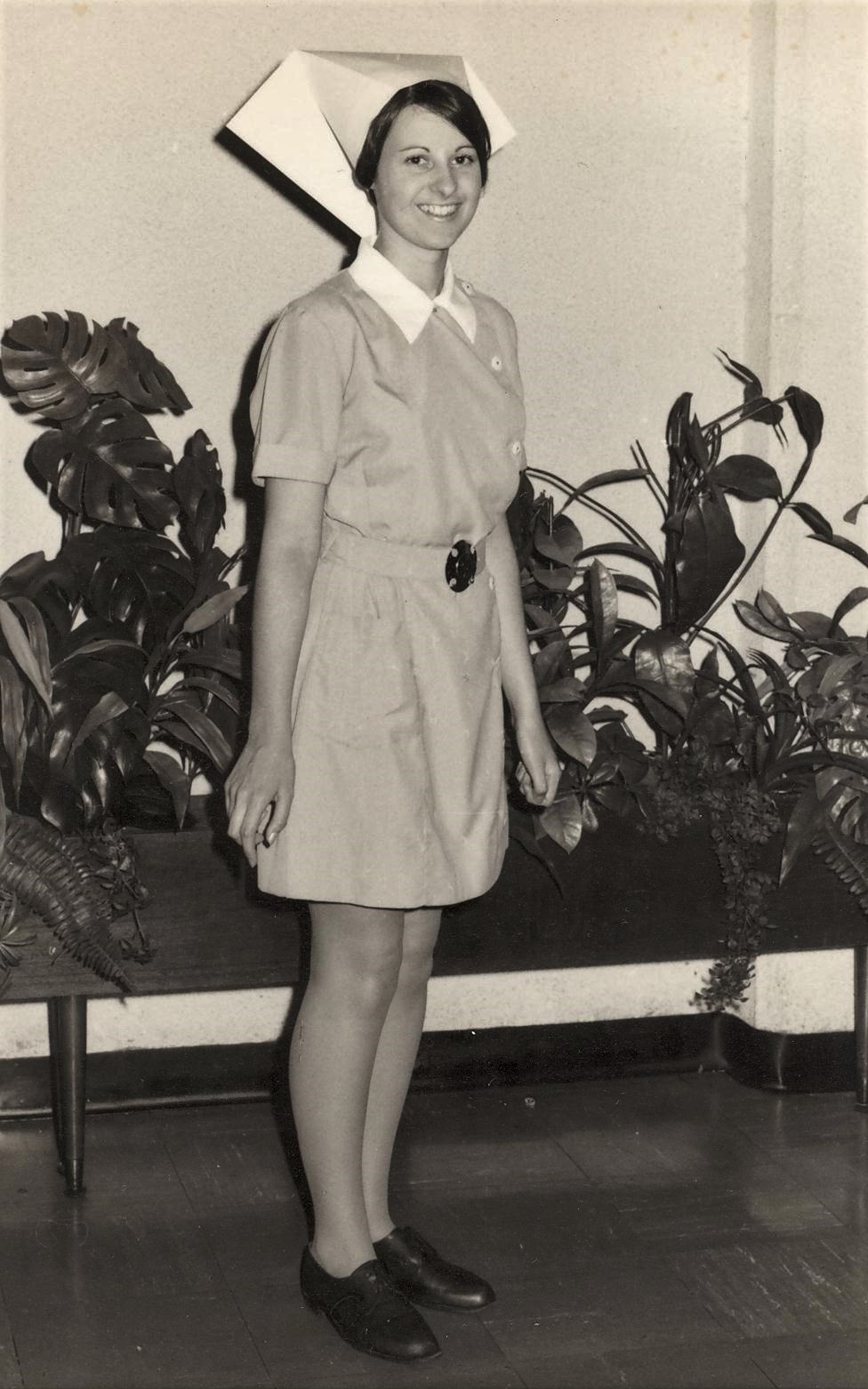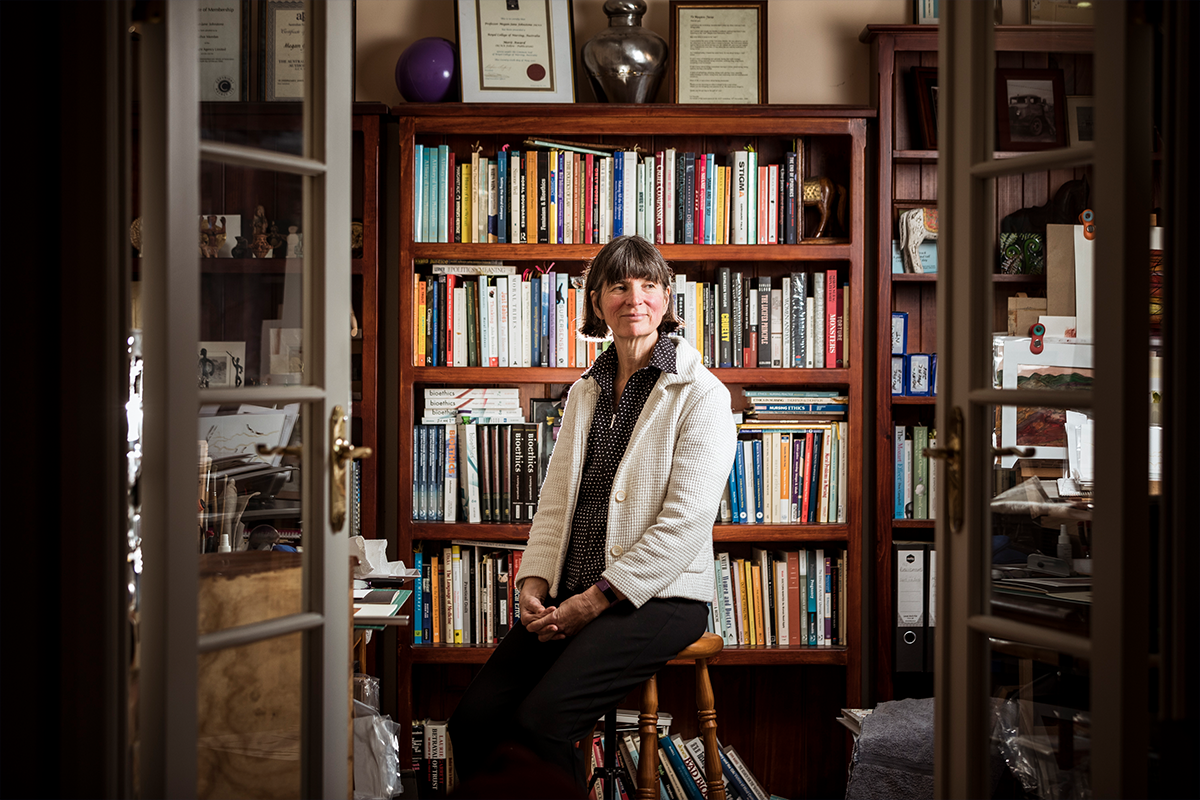
Trish O'Hara. Photograph by Chris Hopkins
If you were one of the lucky ones attending Australia’s first heart transplant back in 1971, you might have spied at the back of the operating theatre a 21-year old scrub nurse watching attentively, thrilled and somewhat astonished to be part of this historic episode.
Trish O’Hara was on the first steps of what has become an extraordinary career in nursing. As a singularly determined young woman who endured a tumultuous childhood and floundered in vital school subjects, Trish was pushing ahead despite family cynics and other hurdles.
Look at her now. She is ‘Our Trish’. Call her Mrs O’Hara in this union, and few would know who you’re talking about. That’s because she is accessible, passionate and inspirational.
Now, on the cusp of her much-anticipated retirement, Trish O’Hara has been fittingly honoured in the Queen’s Birthday list with a Medal of the Order of Australia (OAM) for service to nursing.
It is a tribute to her strong professional expertise that spans almost half a century, in various Australian states and overseas – a career that includes almost 10 years as a professional officer at the Australian Nursing and Midwifery Federation (Vic Branch).
Much of her work has involved voluntary, unpaid positions with professional colleges, health panels and government advisory boards as well as a host of paid senior managerial positions in hospitals, government departments. That’s not all.
‘In a way I have lived two lives,’ Trish, 70, says. ‘I have lived a nursing life and I have lived a military life.’ Her husband of 49 years, Jim, is a retired commodore in the Australian Navy, and his role as commander of various naval vessels led the couple to some fascinating places.
As the wife of a commanding officer, Trish attended official meetings with members of the royal family as well as cocktail parties at embassies and diplomatic missions.
And she has met many Australian war veterans, including a small group who served in Malaysia in World War Two and wanted to honour Malaysian nurses who cared for them. That eventually led Trish and a senior nurse in the armed forces to help establish a post-graduate scholarship and training program in Australia for Malaysian nurses.
Much of Trish’s practical nursing career has focused on cardio-thoracic work. Though she struggled in secondary school, Trish was the sixth-best nursing student in NSW when she graduated in 1970. She then topped the state for cardio-thoracic specialty studies and earnt distinctions when studying a Bachelor of Nursing and a Master of Business Administration by distance education.

Trish O’Hara at her graduation in 1970.
In 1970, soon after marrying Jim, she worked at St Vincent’s Hospital Sydney in the cardio-thoracic unit where she participated in the heart transplant surgery. Later, she moved to Western Australia and worked in the renal transplant unit at Royal Perth Hospital, and then HMAS Cerberus when Jim took another transfer. Immediately after their third child was born, they flew to the UK, where Trish worked and raised their three toddler children while Jim was on naval deployments.
Returning to Sydney in 1980, Trish worked at Lewisham Hospital’s nursing home, and from 1984 to 2001 she was nurse unit manager of intensive care and coronary care at Calvary Hospital in Canberra.
She has also been nurse unit manager in the emergency medical unit at Maroondah Hospital, NUM and patient flow manager at Cabrini Health in Malvern, and NUM at Waverley Private Hospital in South Melbourne.
A member of the Australian College of Nursing since 1995, Trish was chair of the College’s Victorian branch for 10 years.
The biggest challenge facing nursing, in her view, is having governments, employers and other professions fully recognising the professionalism of nursing ‘and respecting it, and not always trying to knock it down’.
She joined the ANMF in every state where she worked. While nurse unit manager at Calvary Hospital, she supported members taking industrial action against unsafe working practices by caring for the ventilated patients to ensure her colleagues could attend stop-work meetings.
‘I have always been committed to the work of the union and this has translated to my working environment,’ Trish says, adding she is ‘in awe’ of the work done by Branch Secretary Lisa Fitzpatrick, especially in advocating for safe patient care and nurse-to-patient ratios.
She has been an educator and mentor to nurses, a professional expert on nursing issues, including appearing as a witness on behalf of the union in court.
‘To understand that professional nursing practice was at risk of dilution, and to see how the union can use its influence in the community to achieve the best outcome for nurses and midwives – these were highlights.’
Trish says the type of care provided by nurses can only be supplied by nurses. ‘A doctor might see the patient once a day, if you are lucky. But who’s there 24 hours a day? It’s the nurses.’
‘When you consider the underlying knowledge and body of knowledge and skills that go into patient assessment, it’s the constant assessments that nurses do to keep patients safe and initiate additional care that really matters. Losing that, or winding it back, is the biggest risk we run in the future.’
Trish clearly remembers when and why she decided to become a nurse. It goes back to when she was a very young girl and would watch from hospital corridors, peering through the glass, as nurses in another room tended to her much-loved younger brother Peter.
Born prematurely and with significant physical disabilities, Peter required intensive personal care and many lengthy periods in hospital.
‘I watched him being nursed, and tears would stream down my face,’ she says. ‘I wanted to know “why?”. Just “why?”. “Why Peter?” ’
When she reached her late teens and these questions coalesced into career ambitions, Trish’s mother sharply told her: ‘You will never make a nurse.’
Trish’s response was powerful: ‘Just watch me.’
The ANMF is eternally grateful that Trish O’Hara more than made it. She has been an important and enduring mentor and advocate for generations of Australian nurses.
‘It’s breaking my heart to leave the union,’ she says. ‘But I think I owe Jim some time.’




